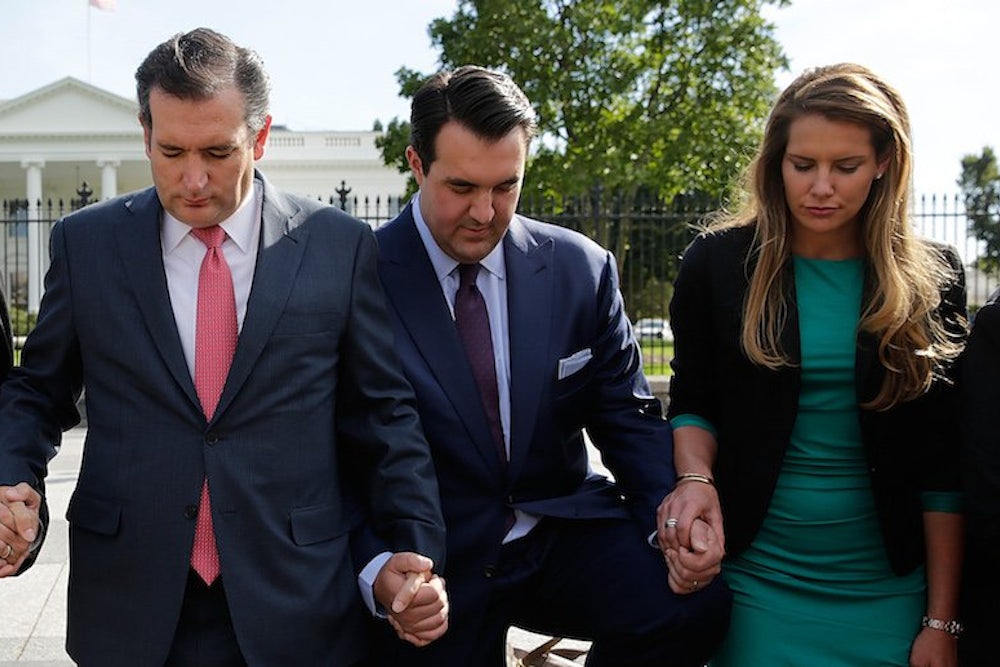If there was any lingering doubt that Ted Cruz wanted to win the Evangelical vote for his presidential bid, it was dissolved during his campaign announcement this morning at Liberty University in Lynchburg, Virginia. Liberty is the world’s largest Christian college and is conservative even by the standards of most religious institutions of higher education; making it the choice of venue was especially revealing. Cruz’s speech, too, was heavily interspersed with shout-outs to Evangelicals: from his declaration that “rights don’t come from man, they come from God almighty” to his repeated references to the United States as a “shining city on a hill.” In case those nods to religious voters were too subtle, Cruz also said it plainly: “Today roughly half of born-again Christians aren’t voting. They’re staying home,” he said to the crowd. “Imagine instead, millions of people of faith across America coming out to the polls and voting our values.”
But it’s not clear that Cruz is the Evangelical heir apparent. Though he’s certainly spent quite a lot of time discussing his Southern Baptist commitments, he appears to be an increasingly divisive figure among Evangelicals themselves. After winning the annual Values Voter presidential straw poll by 42 percent in 2013, Cruz won only 25 percent in 2014, followed closely by Ben Carson and Mike Huckabee. Given the Values Voter Summit's reflective power when it comes to religious conservatives, Cruz's precipitous drop in proportions is notable.
More damningly: Cruz didn’t stand out in a report released by Public Policy Polling this February that surveyed Republicans on 2016 hopefuls as well as a slew of party issues, including Christian-oriented ones. When asked whether or not Christianity should be made the “national religion,” for example, a whopping 94 percent of Huckabee fans said they would support such a mandate; only 51 percent of Cruz supporters said so, lower than the GOP base support level of 57 percent. Though seriously unlikely to ever make it to a ballot, the question of a national religion is useful precisely because it exposes unadulterated sentiment, rather than genuine political strategizing. Cruz had the largest number of supporters replying “not sure” to the question of designating Christianity as our national religion, at 34 percent; the next highest number of not-sures favored Marco Rubio, at 26 percent. In other words: Cruz’s most ardent devotees don’t appear to be especially dedicated to his religious aspirations, despite his frequent efforts at telegraphing them.
If Evangelicals find themselves disinterested in Cruz’s Christian pitch, they may have good reasons. Last September at a gala event hosted by the organization In Defense of Christians (IDC), Ted Cruz took the stage not to extend his sympathies to international Christian leaders gathered to represent persecuted Christians abroad, but rather to bash them for not supporting Israel. He was subsequently booed off the stage.
While Cruz’s inappropriate address was likely nothing more than a stunt meant to appeal to fervently pro-Israel Christians, the fact that he shattered international Christian unity to score cheap political points did not do him any favors with conservative Christians in the media. Remarking on Cruz’s outburst, IDC’s president, Toufic Baaklini, derided the “politically motivated opportunists” who “chose to divide a room that for more than 48 hours sought unity in opposing the shared threat of genocide, faced not only by our Christian brothers and sisters, but our Jewish brothers and sisters and people of all other faiths and all people of good will.”
The incident strikes at the heart of Cruz’s Evangelical problem: For all of his pontificating on God and Christian values, his dedication to Christian principles outside of politics registers as hollow. With the unified Evangelical voting bloc of the 1980s now splintering into different contingencies, it's a bad moment to hang one's electoral hopes on appeals to a fracturing group identity.
Standing “unapologetically with the nation of Israel,” as Cruz put it this morning, is a certain route to Evangelicals’ good graces—but Cruz’s pro-Israel sentiments are not unique among GOP hopefuls and don’t present him as a potential Evangelical favorite absent any other reliably Christian comportment and commitment. His obvious—read: insincere—interest in capturing the Evangelical vote doesn’t do him any favors, either, which could make the entire effort counterproductive. America’s Evangelicals may be peculiar, but they’re not stupid.
